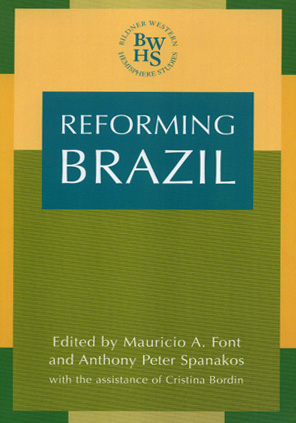Reforming Brazil
Rowman & Littlefield, 2004
Editors: Mauricio Font and Anthony Peter Spanakos
For years, successive governments in Brazil grappled with the vexing issues of unequal distribution of wealth and runaway inflation. In the 1990s, long-overdue reforms began to help tame inflation, streamline bloated and ineffective government and address chronic social ills. But problems and questions remain: Why is Brazil still so poor, and why is inequality so intransigent? Were some reforms counter-productive, or could they have been implemented better?
Reforming Brazil is a thought-provoking examination of these and other important issues facing Brazil today, from privatization and agrarian reform to entrepreneurial programs and hemispheric integration. Written by 11 Brazilianist scholars from a range of disciplines and intellectual traditions, the book offers compelling new insights for international policymakers, economists and scholars of Brazil.
Table of Contents:
Part I: INTRODUCTION
“Dawn of a New Era”
Mauricio A. Font
• “The Reform Agenda”
Anthony Peter Spanakos
Part II: REFORMS
• “Monetary and Fiscal Reforms”
Eliana Cardoso
• “Privatization: Reform through Negotiation”
Maria Hermínia Tavares de Almeida
• “Social Policy Reform”
Sônia Draibe
• “Agrarian Reform”
Anthony Pereira
• “Political Reform: The ‘Missing Link’”
David Fleischer
Part III: INSTITUTIONS, ACTORS, AND REGIONAL CONTEXT
• “Competitive Federalism and Distributive Conflict”
Alfred Montero
• “Industrialists and Liberalization”
Peter Kingstone
• “Entreprenueurs: The PNBE”
Eduardo Rodrigues Gomes and Fabrícia C. Guimarães
• “Working-Class Contention”
Salvador Sandoval
• “Brazil and Hemispheric Integration”
João Paulo Machado Peixoto

